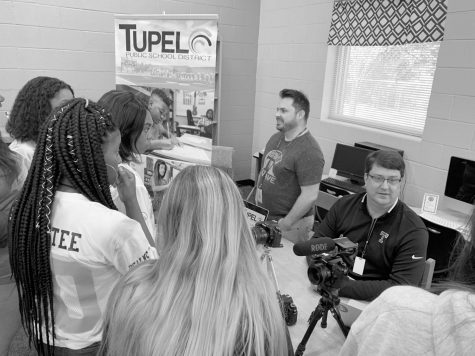THE WEEKLY SCROLL
May 27, 2021
News, tips and advice from Quill and Scroll
The Lede

Photo by Daniel Schludi on Unsplash
Vaccine News
U.S. hits 50% milestone; 12- to 15-year olds are next in line; schools offering prizes for vaccines
Tuesday marked a milestone as the U.S. tries to hit herd immunity — or something very much like it — in its fight to suppress the coronavirus that causes COVID-19.
CNN reported that 50 percent of America’s adult population has been vaccinated, and that half of the 50 states plus territories have reached that same milestone. Just 39 percent of the entire population has been fully vaccinated, but with teens and tweens now approved for vaccines, the overall number should reach 50 percent soon.
Just 14 percent of kids aged 12-15 have been vaccinated so far, while the number jumps to 34 percent of 16- and 17-year olds.
In order to convince their students to help the country suppress the virus, some schools have turned to incentives such as food trucks, prizes, mascots and other pep-rally style inducements.
Other countries, particularly India, are dealing with major outbreaks still. That means while Americans may feel like partying pretty hard this summer, there’s still some caution needed when anyone visits a foreign country. In fact, vaccination “passports” are still in development, and may be used by some airlines, countries and other destinations. Here’s one story about how they’ll work.
Here’s what you can do
Now that teenagers are getting the vaccination, it’s time to do that story about whether your school, community, district or state is looking at incentivizing vaccination. Do your classmates need incentive to be vaccinated? Do they want to? How do their parents feel? Is there an anti-vaxx movement in your community or school? Has your state hit the 50 percent mark? If not, why not? Will it ever? Are students at your school traveling abroad this summer? Where? What extra precautions will they take?
CRT nixed
Tennessee officially makes critical race theory a taboo subject
Tennessee’s governor this week signed a bill into law restricting how race and bias can be taught in schools. In the state legislature’s crosshairs was something we talked about last week in the Scroll, critical race theory, or the idea that you can’t fully understand U.S. history without also examining the role that racism has played in that history.
The conflict about CRT is in its interpretation. Scholars who specialize in the subject argue that racism shaped America and still has an impact on our day-to-day lives. Those who don’t want it taught in schools say that it … well, I’ll let Tennessee Gov. Bill Lee’s aide explain.
Casey Black, the governor’s press secretary, said “(Lee) believes Tennessee students should be taught history and civics with facts, not divisive political commentary.”
Black and others argue that white students are made to feel responsible for racism.
Tennessee, Oklahoma and Idaho are the three states that now have laws against teaching CRT — typically a college-level class. Iowa’s governor is expected to sign a bill into law as well. Texas’ senate and North Carolina’s senate have passed bills that will go to those states’ Houses of Representatives, where they are also expected to pass.
Here’s an article that breaks down the Republican strategy behind influencing school boards to support these bills and how Democrats may combat those efforts.
Here’s what you can do
As we noted last week, if you live in one of the states targeted by these bills, start asking teachers and administrators how will it change instruction in your social studies classes and in other curricula as well. If you’re not in one of those states, will you be soon? How different would your classes look — if at all — with a ban on critical race theory?
Further, this is an issue that has become a hot-button in local school boards? Has your school board discussed it? Will they? Do you even know the members of your school board? They make decisions at every meeting that affect your lives and your education. Do you hold them accountable by reporting on those decisions and their impact?
BLM spread criticized
North Carolina yearbook journalists catch heat for … uh … doing journalism
One of the more unfortunate news cycles of the year is May/June when a few parents, school board members and others get their knickers in a twist about something in a school yearbook.
While there have been a few interesting yearbook stories this year, the most disheartening comes from Alamance County, North Carolina, where a spread on students’ involvement with Black Lives Matter — in a “Year in Review” style section — has caused consternation and an unnecessary debate about what “should” be in a school yearbook.
The Alamance-Burlington school board meeting this week ended in shouting as some parents rose to complain about the Southern Alamance High School yearbook’s BLM spread.
One parent said that the spread “promotes riots and not peaceful protests, more or less saying nothing will be done without a riot.” Others raised the old canard that yearbooks shouldn’t have controversial or even newsworthy elements, but should instead be pure public relations tools.
One recently graduated Southern Alamance alumnus wondered how this became a big deal, considering what was in last year’s book.
“If the yearbook isn’t supposed to be political, then why was that allowed?” Zach Clemmons said. “There was no rage on Facebook. There was no name-calling of a 16-year-old on Facebook about a Blue Lives Matter flag being here.”
Here’s what you can do
The first thing that needs to be done is to make sure your entire community — students, parents, administrators, business persons, school board members — understands that a yearbook is journalism, and that journalism’s job is to report on events that affect people’s lives. No politics? All we can do here at Quill and Scroll is cite the old axiom: “You might say you don’t do politics, but politics will do you.”
Quill and Scroll chapters should be actively promoting the power of good journalism, that’s for sure. How about scheduling a presentation for your administrators, school boards and others about the rights and responsibilities that you embrace as journalists, and how you take care to produce thoughtful journalism in line with Quill and Scroll’s eight guiding principles: truth, learning, leadership, loyalty, initiative, integrity, judgement and friendship.
But it’s also an opportunity for you to think about practicing Solutions Journalism, a discipline that has been developed over the last eight years in response to criticism of journalism that seems only to focus on problems. Of course, BLM itself is seen by its members as a movement seeking to implement solutions to unjust killings. Clearly, we don’t all view the world in the same way.
It’s An Honor
Yearbook Contest!
Here’s your chance to get your entries in early for the Yearbook Excellence Contest
Just sitting around yearbook class wondering what to do for these last few weeks? We can help. The 2021 Yearbook Excellence Contest is open for entries! Get started today.
In addition, we’re excited to announce two changes for the 2021 contest, which has an entry deadline of Oct. 10, 2021.
First, we’ve raised the enrollment for the large school division (Class A) to schools with at least 1,000 students in grades 9-12, meaning schools with fewer than 1,000 in those grades may choose to enter Class B.
Second, we’ve expanded the contest from 18 to 30 categories, including these:
- Cover Design
- Performing Arts Spread
- Performing Arts Photography
- Sports Feature Photo (Separated from Sports Action Photo)
- Pandemic Spread
- Pandemic Photography
- Sports Feature Writing (Separated from Sports Spread)
- Alternative Story Form
To review all 30 categories for the Yearbook Excellence Contest, go to this page.
Induction season!
There’s still time to honor seniors and induct new members for next year
Time is running short if you’re planning to honor seniors and induct new members — be they sophomores, juniors or seniors — into our international journalism honor society.
We’re able to take and fulfill orders, even as Quill and Scroll staff work from both our home offices and our offices at the Adler Journalism Building on the University of Iowa campus.
We published this update in late 2020. It is still valid and includes a simplified order form (See Video Below) for schools and advisers willing to pay via credit card, and an offer to host an online induction ceremony for your students. The sooner you induct new members, the sooner they’ll be able start planning chapter activities in the spirit of Quill and Scroll. Here’s a link to a PDF file of the Q&S Chapter Handbook if you don’t already have it.
Also, check out the clever use of our Gold Keys from these young women at Bryant High School in Bryant, Arkansas.
Hey @QuillandScroll, check out this cool way my student newspaper editors Carly Lidzy and Emily Rutledge included their winner pins in their graduation attire! pic.twitter.com/gxHxJLH01f
— Lisa Stine (@lisa_stine) May 22, 2021

Roger Ebert, Quill and Scroll member. Photo courtesy WikiCommons.
Alumni service
Quill and Scroll can create an alumni directory for your school’s chapter
Planning a fundraiser for your school’s journalism program? How about an anniversary of your chapter or some other big event? Maybe you just want to identify some “big names” from your chapter’s past to invite as guest speakers?
Quill and Scroll has a record of every single person inducted into the organization since its founding in 1926. That’s more than 1.5 million people worldwide over the past 95 years.
If you’re a relatively new Quill and Scroll school or organization, then you likely already know all the names you’ve inducted over the past few years. But if you’ve had a Q&S charter for longer than that, we can help.
Did you know Fred “Mr.” Rogers was a Quill and Scroll member? Greater Latrobe High School in Pennsylvania, class of 1946. And Roger Ebert, the famous film critic? Urbana High School in Illinois, class of 1960.
Here’s what you can do
Begin by emailing us at [email protected]. Simply let us know in that email what school you’re from and how soon you’d like a complete list of Q&S alumni from your school. All of our records from 1926 through 2004 are in paper form, so it takes some time to retrieve those from our files in the basement of the Adler Journalism Building.
Once you send the email request, we’ll get started putting together the list. When we’re done, we’ll invoice you based on a $25/hour rate. We anticipate most requests can be completed in less than four hours, though it may take us a few days to set aside time to complete the request.
You receive a list of members’ names, the year they were inducted, and an email for those inducted over the past decade.
NME
Register, darn it!
You have until June 15 to enter your news magazine, newspaper, online news site or multimedia/multi-platform into the prestigious News Media evaluation critique service sponsored by Quill and Scroll.
We have a team of professional journalists, journalism professors and skilled former journalism advisers (Hall of Famers, all) ready to provide valuable feedback that your staffs can build on for next year. We GUARANTEE that you will receive your rating and feedback before Sept. 1, 2021.
Winners receive the coveted Gallup Award. Learn more about and sign up for the service here.
Chapter of the Year
Submit your application by June 4 and publicize your chapter’s good works
Applications are now being accepted for the 2021 Quill and Scroll Vanessa Shelton Chapter of the Year Award. The deadline is June 4, and the winner will be announced in early September. The form is at this link.
Over the past 95 years, Quill and Scroll has granted charters to more than 11,000 schools around the world. When a school’s journalism program receives its charter, students in the school begin a Quill and Scroll chapter there. Quill and Scroll does not dictate how active a chapter should be, but the organization’s “Chapter Manual” does provide some guidance on the value of an “active chapter,” the activities it may engage in, and its general goals:

Tupelo’s Quill and Scroll chapter hosted a journalism job fair in 2019. Photo courtesy Shari Chumley.
“The chapter can accomplish these goals: (1) inspire members of the staff to greater efforts; (2) attract students of higher ability to publications/media work by offering them journalistic recognition and honors; (3) provide incentive for the development of the journalism department and the improvement of school publications/media; and (4) secure greater recognition of journalism work by students, school officials and the community.”
The chapter at Tupelo High School in Tupelo, Mississippi, for example, held a journalism job fair in 2019, before the pandemic. The 2020 winning chapter, Francis Howell North High School in Missouri, hosted several events for Scholastic Journalism Week, promoted diversity in the school, and raised money for community organizations.
The winning chapter gets a trophy, free Q&S memberships for the coming year, and a spot on the Q&S Student Advisory Board.
What’s Viral?
John Cena
Apologizes
John Cena’s general movie demeanor can be defined as the “unapologetic tough guy,” the person who never backs down and has the chiseled physique to back up his talk.
This week, as Cena’s new movie “Fast and Furious … (checks notes) 9” gets ready for its June 25 release date around the world, Cena had to take on an unfamiliar role after he said that he was excited that Taiwan would be one of the first countries to see the film.
That statement didn’t sit well with the Chinese government, which views Taiwan as a territory that eventually will again become a part of China. Taiwan’s official name is “The Republic of China” as opposed to the mainland Chinese government, which is called the “People’s Republic of China.”
The tweet below features Cena’s attempt to apologize to China so that he doesn’t offend the people or the Communist Party that runs China.
John Cena apologized in Chinese on Sina Weibo after calling Taiwan a country during an interview promoting Fast & Furious 9 pic.twitter.com/dzRKIYgEzL
— Joe Xu (@JoeXu) May 24, 2021
What you can do about it
This is just another great example of how you can use popular culture to teach your audience about something they might not have looked into before. Here’s a great sample “explainer”-type story done by the BBC explaining why China and Taiwan have split and what the current situation is like.
Just A Thought
AP reporter sacked
Her social media presence said she supported BLM; it eventually got her fired
The Associated Press made unwanted news of its own this past week when it buckled to online pressure to fire a reporter, 22-year-old Emily Wilder, a recent graduate of Stanford University.
Wilder’s sin? She had previously been active in supporting Palestinian causes, and supporters of Israel’s crackdown on Palestinian dissidents complained loudly to the AP about what they considered to be a violation of her journalistic obligation to remain politically neutral.
Other AP reporters took to Wilder’s defense in a letter to their bosses.
A statement from @AP staff: We love the AP. We also want it to change. https://t.co/lkcmQsBNLr
— Aaron L. Morrison (@aaronlmorrison) May 24, 2021
More than anything, the employees want AP to be transparent about their reasons for firing Wilder, and to state that they didn’t do it because of online political pressure.
This may not necessarily be a story for your news publication, but it certainly should spur you to think about the old-school journalistic value of remaining publicly neutral about what might be considered political issues. Do you have a policy against social media stances taken by staff members? If your publication supports Black Lives Matter, for one example, are you afraid that you may be alienating some of your readers? And if so, how valuable is advocacy for a particular position?
In our current political environment, it’s still pretty amazing how a simple statement like “Black Lives Matter” can become a political lightning rod, but it has. I would urge you as a Quill and Scroll chapter to think about how you can sponsor polite discussions about journalism, its values and how those are put into practice in your newsrooms.
Transparency works for governments, and it should also work for journalists. And we have to ask if it’s even possible to ask high school students to remain politically impartial when we also encourage them to be active in their towns to fulfill a community service requirement.
Here’s a perspective from Margaret Sullivan in The Washington Post.

